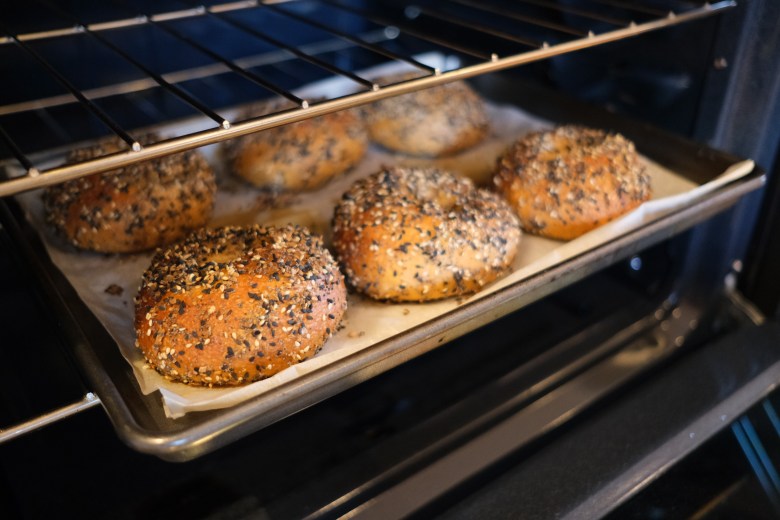WICKER PARK — Jonathan Sessa thinks Chicago has a bagel problem.
The Jewish comedian, who is originally from New York, makes bagels in his Wicker Park apartment and sells them on Instagram, a hustle he started early in the pandemic. The bagels have grown in popularity, with hundreds of people following updates from “Bagel Boy.”
Sessa’s even had to use a lottery system to pick who can buy the bagels, since there’s more demand than he can provide each week. They are “crunchy on the outside and fluffy on the inside, made with love, like how bagels should be,” Sessa said.
The bagels — which come in plain, poppyseed, everything, onion and shallot, za’atar and black and white sesame flavors — are $4 each, just enough for Sessa to break even, he said.
“This is the food I grew up eating. I made these first just because I was homesick. I missed New York and not having a bagel place on every corner,” Sessa said. “It’s building connections, and I’m really proud of the bagels. And people seem to like them, which makes me happy.”
Sessa isn’t the only one with gripes about local bagels — although Chicagoans typically don’t take kindly to East Coasters dissing Midwestern fare. There’s no shortage of guides directing Chicagoans to great bagels, many of which come from Jewish bakeries or New Yorkers who set up shop in the city and suburbs.

Before becoming a bagel baron, Sessa spent years grinding it out on the improv circuit, doing sketches and hopping on mics in New York City. He came to Chicago in 2018 because of its tradition of churning out successful comics, he said. Things seemed to be gaining traction and Sessa was slated to teach sketch writing when “COVID happened and it all disappeared,” he said.
“I was the only person who got depressed because of COVID,” Sessa joked. “I remember being in therapy asking, ‘Should I make these bagels?’ I needed something to do. I needed to find Jesus.”
When Sessa moved to the city, he felt Chicago bagels were “either too bougie and crisp or too gummy and pale,” he said.
“I was emotionally devastated,” Sessa said.
With a background in home cooking, a copy of “Dessert Person” by Claire Saffitz he got for Hanukkah and a passion for “s—posting and [doing] bits,” Sessa started experimenting with the famous Jewish food during lockdown, “making small batches while figuring out my life,” he said.
Sessa posted a TikTok of bagels he made with a joke about how he had to solve the city’s bagel problem as “the only Jew from New York City in Chicago.” His phone blew up.
Messages of solidarity from New York City expats and Chicagoans looking to get a taste came pouring in, and “Bagel Boy” was born.
“The fact that a reporter is at my house while I’m kneading bread is confusing enough already,” Sessa said as he prepared bagels recently. “But the response has been overwhelming. I can’t even keep up with the demand.”
But why are Chicago bagels lacking?
“People say it’s because the waters are different, but I think that’s baloney,” Sessa joked. “I think there’s just not enough Jews in Chicago.”

Sessa started tinkering with his cookbook’s bagel recipe until it “became something I can proudly call my own,” he said. He posted pictures of his first bagels online, and friends responded, “I’d buy those.”
The TikTok took off and Sessa slowly but surely expanded from offering 12 to 16 to 24 bagels every week, “as many as I can physically make with these rods I have in my back,” he said.
The forms to enter the raffle are open on Sessa’s page Monday or Tuesday through Thursday afternoon. People can choose any two bagels they’d like, and Sessa picks customers at random. Bagels are ready to pick up Saturday or Sunday morning at his apartment. The preparation takes two days, he said.
On a recent day when customers picked up their orders, Sessa hustled across his kitchen in white Crocs with a bagel charm. He greeted each customer at his door and wrote their names with an exclamation point on their brown paper bag of baked goods.
“My bagel friends helped me move into my new apartment,” Sessa said. “I moved here really not knowing anybody, and building a network was really hard. And now some of my best friends started as customers.”


Sessa will continue his bagel lottery for as long as he can, but he has no plans of opening a store, “which people have a hard time with, but that’s not for me,” he said.
Bagels have put him on a brighter path, and that’s more than enough, Sessa said.
“I thought I could plan out my life, but the world doesn’t care about your plan. So I don’t want to overthink it. I never thought I’d be doing this,” Sessa said. “Now, I figure if I put my head down and do things I care about, whether it’s food or comedy, people will respond.”
Sessa handed over a brown paper bag.
“We all deserve a good bagel,” he said.
Support Local News!
Subscribe to Block Club Chicago, an independent, 501(c)(3), journalist-run newsroom. Every dime we make funds reporting from Chicago’s neighborhoods. Already subscribe? Click here to gift a subscription, or you can support Block Club with a tax-deductible donation.
Listen to the Block Club Chicago podcast:


